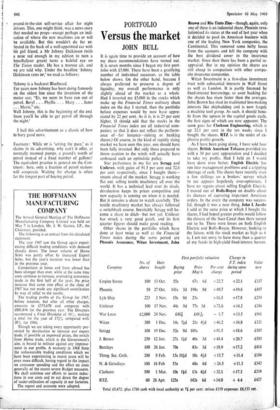Versus the market
PORTFOLIO JOHN BULL
It is again time to provide an account of how my share recommendations have turned out. It is seven months since I began my first port- folio with £5,000. There have been a gratifying number of individual successes, as the table below shows. On the other hand, because I always preferred to preserve a degree of liquidity, my overall performance is only slightly ahead of the market as a whole. Had I invested my £5,000 in the stocks which make up the Financial Times ordinary share index on the day I started, then the portfolio before expenses would by now have appre- ciated by 22 per cent. As it is, it is 25 per cent higher. (I should add that the stocks in the Financial Times index are all industrial com- panies; so that it does not reflect the perform- ance of-for instance-mining or banking shares.) Of course, in the kind of rapidly rising market we have seen this year, one should have been fully invested. But only those prepared to throw caution to the winds will actually have embraced such an optimistic policy.
Star performers in my list are Scragg and Unilever, with gains of 91.5 per cent and 72.6 per cent respectively, since I bought them- streets ahead of the market. Scragg is working flat out, selling textile machinery all over the world. It has a technical lead over its rivals, devaluation keeps its prices competitive and new capacity is coming on when it is needed. But it remains a share to watch carefully. The textile machinery market has always followed a switchback course. Inevitably Scragg will be- come a share to ditch-but not yet. Unilever has struck a very good patch, and its first quarter figures should make good reading.
Other shares in the portfolio which have done at least twice as well as the Financial Times index during the same period are Phoenix Assurance, Witan Investment, John Brown and Rio Tinto Zinc-though, again, only one of these is an industrial share. Phoenix revo- lutionised its status at the end of last year when it decided to pool its American business with one of the leading New York companies, the Continental. This removed some hefty losses from the accounts and left the company with the best dividend cover in the insurance market. Since then there has been a partial re- appraisal. But in my opinion the shares are still cheap in comparison with other compo- site insurance companies.
Witan Investment is a first-class investment trust with substantial interests in Wall Street as well as London. It is partly financed by fixed-interest borrowings, so asset backing for the shares has risen faster than the averages. John Brown has shed its traditional loss-making interests like shipbuilding and is now largely a machine tool group. As such, it should bene- fit from the upturn in the capital goods cycle, the first signs of which are now apparent. The same goes for Clarkson Engineering, which is up 32.1 per cent in the ten weeks since I bought the shares. RTZ is in the midst of ex- plosive profits growth. , As I have been going along, I have sold four shares. British American Tobacco provided me with a 30 per cent appreciation and I decided to take my profits. Had I held on I would have done even better. English Electric has run into management problems and a crippling shortage of cash. The shares have recently risen a few shillings on a brokers' survey which to me appears hopelessly over-optimistic. I have no regrets about selling English Electric. I moved out of Rolls-Royce on doubts about its chances of capturing important American orders. In the event the company was success- ful, though it was a near thing. John I. Jacobs I sold at the same price at which I bought the shares, I had hoped greater profits would follow the closure of the Suez Canal than there turned out to be. There were losses on both English Electric and Rolls-Royce. However, looking to the future, with the stock market as high as it is, I am not sorry to have more than a quarter of my funds in high-yield fixed-interest havens.
Company No. of shares Date bought First portfolio valuation Buying Price Per cent
price May 6 change
Change in F.T. index during same period Value now Empire Stores
100 13 Oct.
55s 67s 6d +22.7 +22.1 £337 Phoenix 50 27 Oct. 141s 3d 198s 9d +40.7 +19.6 £497 Lyle Ship 225 3 Nov. 19s 9d 23s +16.5 +17.8 £259 Unilever 100 17 Nov.
44s 9d
77s 3d +72.6 +14.3 £386 War Loan £2,000 24 Nov. £48 £4816- - 1.7 +13.5 £961 Witan 300 1 Dec. 14s 74d 21s 41d +46.2 +16.8 £321 Scragg 100 19 Dec. 52s 9d 101s +91.5
+18.6
£505 J. Brown 250 12 Jan. 27s lid 40s 3d +48.4 +20.7 £503 Barclays 100 26 Jan. 70s 83s 3d +18.9 +17.2 £416 Throg. Sec. Grth. 200 9 Feb. 15s 101d 18s 44d +15.7 +11.4 £184 N. & Grindlays 100 16 Feb 55s
68s 6d +24.5 +11.5 £342 Clarkson 500 1 Mar. lOs lid 13s 41.4 +32.1 +17.3 £334 RTZ. 60 26 Apr. 125s 142s 6d +14.0 + 4.4 £427 Total £5,472: plus £780 cash with local authority at 71 per cent: minus £119 expenses: £6,133 net.






































 Previous page
Previous page